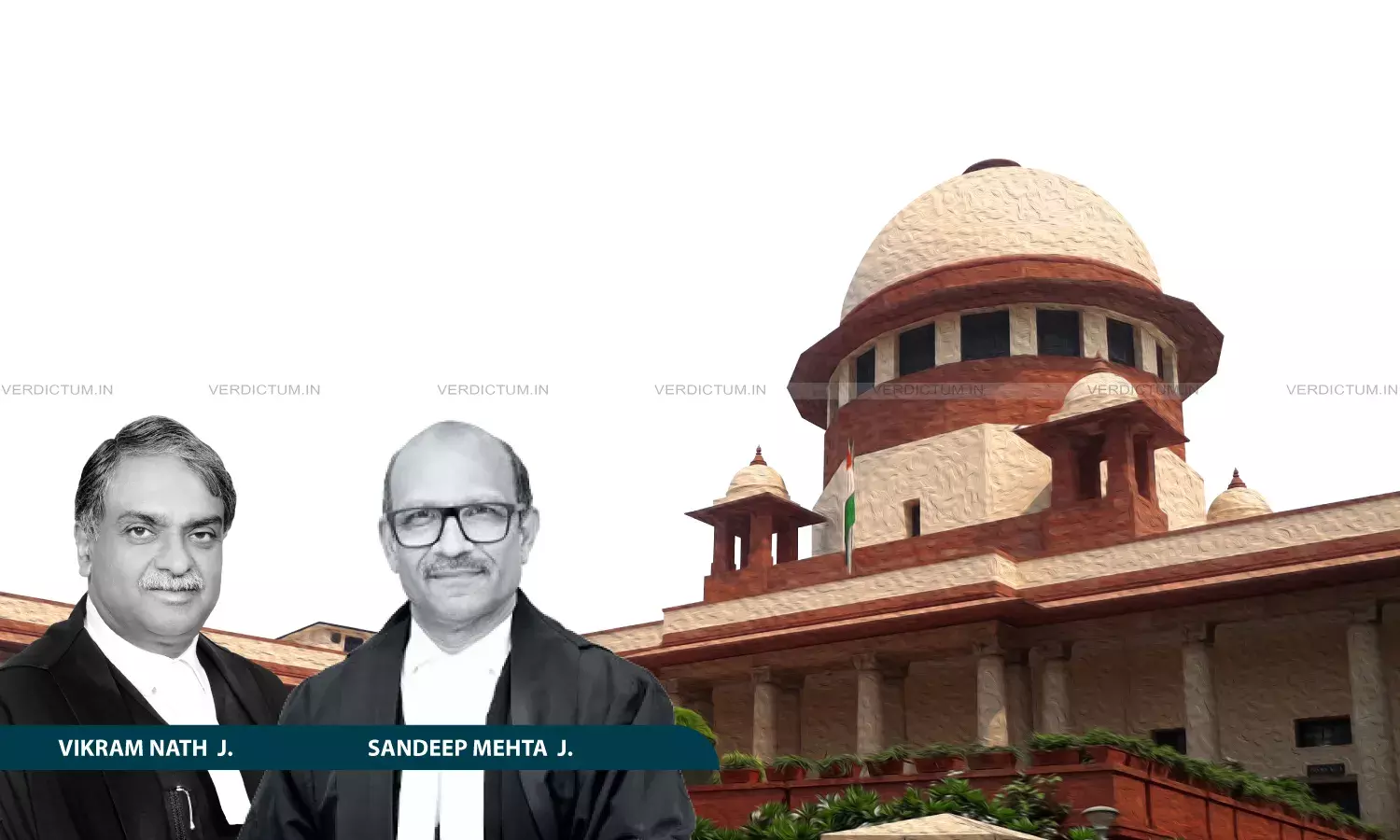Father’s Modest Obligation: Supreme Court Orders Man To Pay ₹ 10 Lakh To Estranged Wife For Daughter’s Marriage Expenses
The Appeal before the Supreme Court arose from a judgment of the Delhi High Court affirming the decree of divorce granted by the Family Court.

Justice Vikram Nath, Justice Sandeep Mehta, Supreme Court
The Supreme Court has ordered a man to pay ₹10 lakh to his estranged wife for meeting the reasonable expenses of his daughter’s marriage. The Apex Court further held that it is a father’s duty to provide for his children, and meeting the marriage expenses of his daughter is a modest obligation.
The Appeal before the Apex Court arose from a judgment of the Delhi High Court affirming the decree of divorce granted by the Family Court. The wife confined her claim to seeking an amount of ₹10 lakh towards the marriage expenses of her daughter.
The Division Bench of Justice Vikram Nath and Justice Sandeep Mehta held, “It is clear that the litigation between the parties has been prolonged and acrimonious. Yet, the appellant-wife has been reasonable in limiting her claim before us. She has raised and supported both children largely on her own. It is a father’s duty to provide for his children, and meeting the marriage expenses of his daughter is a modest obligation. We are of the considered view that the respondent can and should contribute Rs.10,00,000/- (Rupees Ten Lakhs only) for this purpose as meeting the reasonable expenses of his daughter’s marriage is a natural extension of his duty as a parent, irrespective of differences with the spouse.”
AOR Astha Sharma represented the Appellant, while the Respondent appeared in person.
Factual Background
The parties got married in the year 1996 and have two children from the marriage. In 2009, the respondent-husband filed a divorce petition under section 13(1)(ia) of the Hindu Marriage Act, 1955, on the ground of cruelty. The husband alleged various instances of mental cruelty by the wife, whereas the wife contended that she herself had been subjected to mental and physical cruelty. The appellant-wife thereafter filed a complaint under Section 12 of the Protection of Women from Domestic Violence Act, 2005, against the husband and his family members.
The Mahila Court directed the husband to pay maintenance of Rs 7,500 per month. In 2013, the husband filed an application in the DV Act proceedings seeking DNA testing of both children, claiming they were not his. Eventually, the main complaint under the DV Act was dismissed. On appeal, the appellate Court held the husband guilty of domestic violence and directed him to pay Rs 2 lakh to the appellant-wife. This was enhanced to Rs 7 lakh by the High Court in a revision filed by the appellant wife. Thereafter, the Family Court granted divorce on the grounds of cruelty. The appellant-wife challenged this before the Delhi High Court, and by the impugned judgment, the decree of divorce was upheld. It was in such circumstances that the wife approached the Apex Court.
Reasoning
On a perusal of the facts of the case, the Bench found that the marital relationship between the parties ceased to exist in substance. An attempt at mediation also proved unsuccessful. “Since the appeals are pressed only to the limited extent of payment of a certain amount, and in view of the long separation and irretrievable breakdown of the marriage, we find no reason to interfere with the decree of divorce granted by the Family Court and affirmed by the High Court”, it stated.
Coming to the issue of contribution for the daughter’s marriage, the Bench noted that the parties had taken conflicting stands on the husband’s income. “Nevertheless, on our consideration of the record and submissions, we are satisfied that the respondent is capable of making provision for his daughter’s marriage”, it added.
Highlighting the fact that meeting the marriage expenses of the daughter is a modest obligation of the father, the Bench directed the respondent-husband to pay Rs 10 lakh to the appellant-wife towards the marriage expenses of their daughter.
“The decree of divorce granted by the Trial Court and affirmed by the High Court stands affirmed subject to the direction contained in paragraph 10 above”, it concluded.
Cause Title: ABC v. XYZ (Neutral Citation:2025 INSC 1102)
Appearance
Appellant: AOR Astha Sharma, Advocates Sanjeev Kaushik, Simranjeet Singh Rekhi
Respondent: Respondent-in-person

